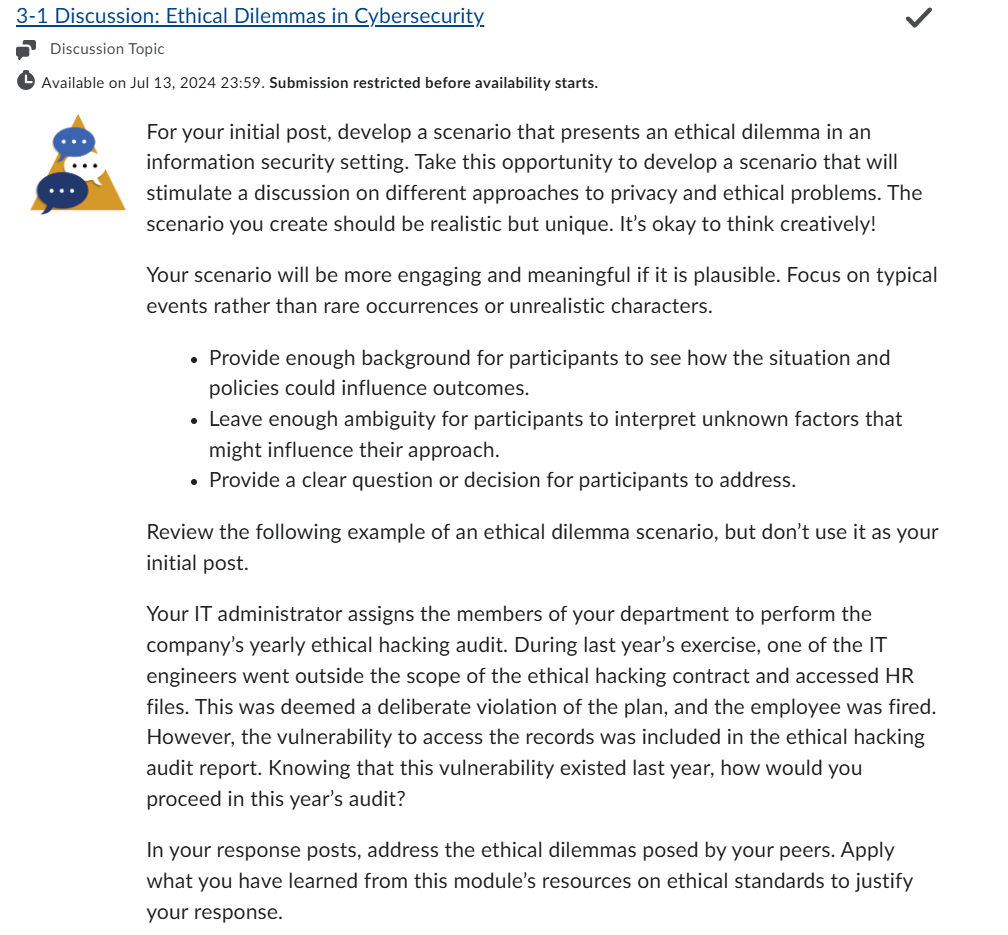3-1 Discussion: Ethical Dilemmas in Cybersecurity ...
CYB 260: Legal and Human Factors of Cybersecurity
3-1 Discussion: Ethical Dilemmas in Cybersecurity

For your initial post, develop a scenario that presents an ethical dilemma in an information security setting. Take this opportunity to develop a scenario that will stimulate a discussion on different approaches to privacy and ethical problems. The scenario you create should be realistic but unique. It’s okay to think creatively!
Your scenario will be more engaging and meaningful if it is plausible. Focus on typical events rather than rare occurrences or unrealistic characters.
- Provide enough background for participants to see how the situation and policies could influence outcomes.
- Leave enough ambiguity for participants to interpret unknown factors that might influence their approach.
- Provide a clear question or decision for participants to address.
Review the following example of an ethical dilemma scenario, but don’t use it as your initial post.
Your IT administrator assigns the members of your department to perform the company’s yearly ethical hacking audit. During last year’s exercise, one of the IT engineers went outside the scope of the ethical hacking contract and accessed HR files. This was deemed a deliberate violation of the plan, and the employee was fired. However, the vulnerability to access the records was included in the ethical hacking audit report. Knowing that this vulnerability existed last year, how would you proceed in this year’s audit?
In your response posts, address the ethical dilemmas posed by your peers. Apply what you have learned from this module’s resources on ethical standards to justify your response.
SAMPLE SOLUTION
Hello class,
You are working as a security analyst at a local bank when one day you walk in and the whole office is silent and standing around a handful of computers. You walk over and see what everyone is looking at and notice that the homepage for the website and application have been change to a photo of a meme with giant red letters that say "LoLz HaCkEd". Everyone in the security team is called into a meeting and an audit is performed. It appears that a user was able to gain access to a developers backdoor and was able to change around the homepage. However, their does not appear to be a security breech, for now. Your team gets to work patching the holes in the network while working with the developers to close their doors in the code. Once your team is satisfied with the solution, someone finds a clue to who the perpetrator is. You see that they are local college student and have to decide if it is worth it to call the cops on this person, to handle it yourself and confront them or offer the young adult an internship to help you fix your security.
Nicholas Allegra was once hired by apple after creating a jailbreaking app for the iPhone. He was also a young college student who created an application that could jailbreak iPhones to allow users to download apps for free or change their OS. Apple had a dilemma to either keep fighting the Nicholas, sue him or hire him and decide that hiring him was the correct choice. However, not everyone feels that way. Hackers like George Hotz who was sued for jailbreaking PlayStation 3's had his lawsuit dropped if he agreed to no longer bypass Sony's security and paid a fine. There are different ways to handle hacking scenarios and no one way is correct.
References
https://www.smh.com.au/technology/iphone-hacker-golden-boy-hired-by-apple-20110830-1jj18.html
https://www.wired.com/2011/04/sony-settles-ps3-lawsuit/
SAMPLE REPLY
Hello ****,
Your scenario brings to light a fascinating ethical dilemma in cybersecurity. The situation you described, where a local college student hacked into the bank's website, presents several intriguing options. The examples of Nicholas Allegra and George Hotz illustrate the varying ways companies handle such incidents.
A best practice in this scenario would involve a thorough evaluation of the hacker's intentions and skills. If the student's actions were more mischievous than malicious, offering an internship could turn a potential threat into a valuable asset. However, this decision must be balanced with the need to uphold legal and ethical standards.
Your team's approach to patching the holes and collaborating with developers is commendable. Ensuring that such vulnerabilities are addressed promptly is crucial in maintaining the security and integrity of the bank's systems.
What factors would you consider in deciding between legal action and offering a constructive opportunity like an internship?
Thanks for sparking this important discussion!
